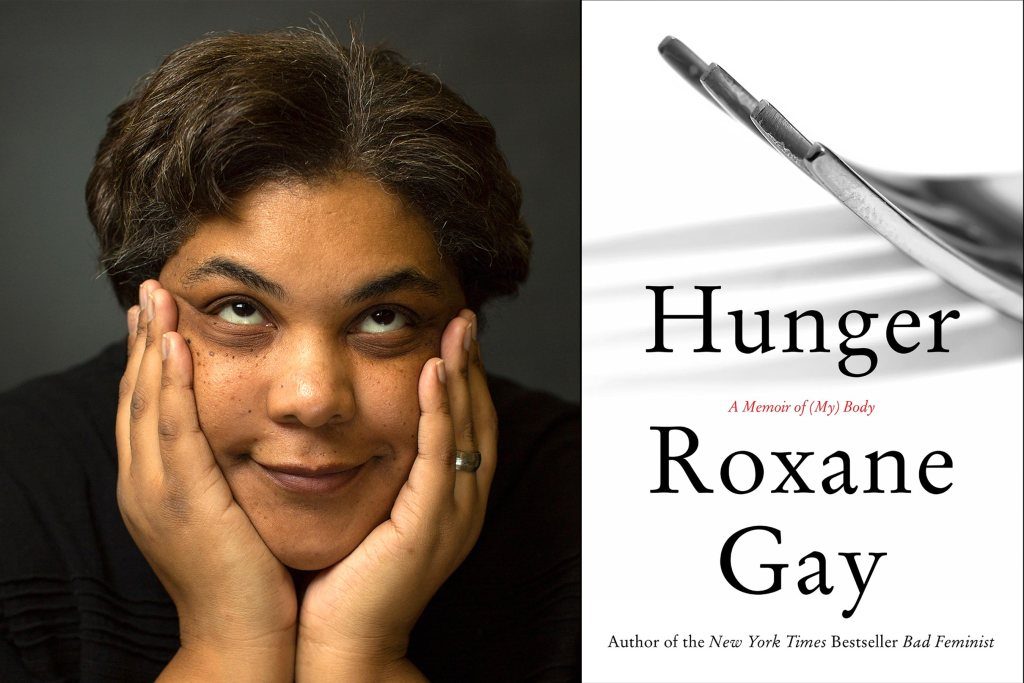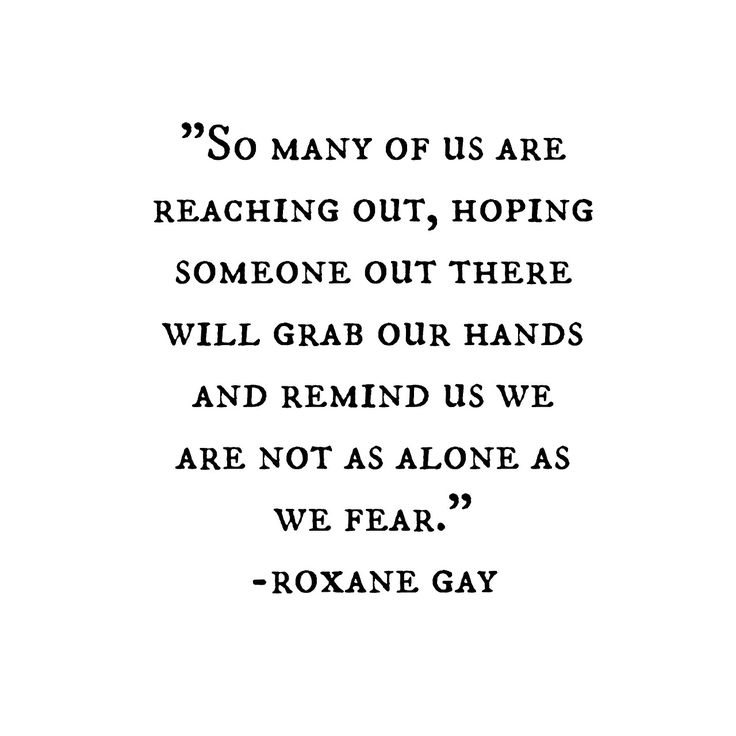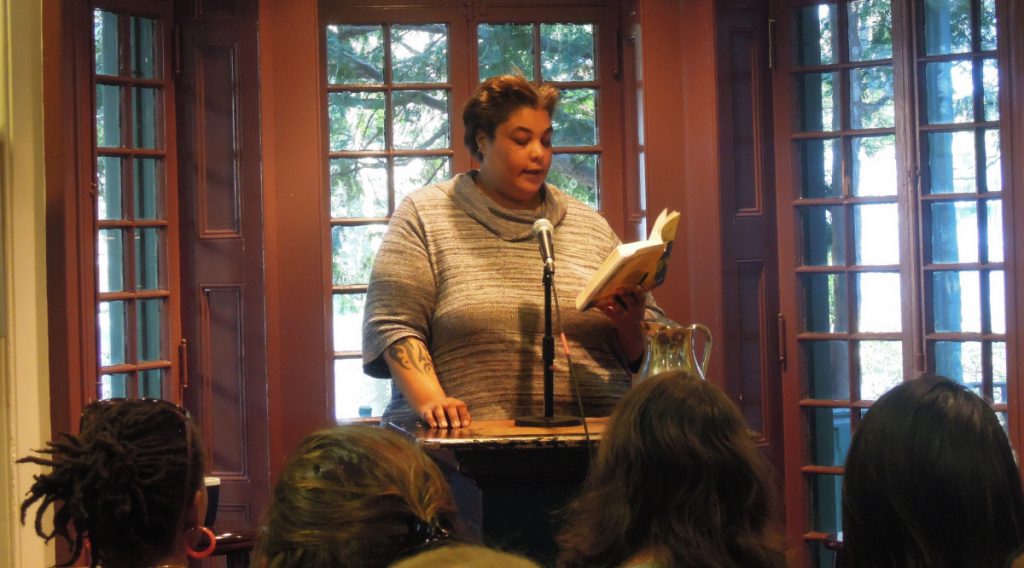After reading “Shrill“, it seemed like a logical next step to read Roxane Gay’s new book “Hunger: A Memoir of (My) Body.” Again, I wanted to dedicate one post to the book review. 
“This is not a weight-loss memoir. There will be no picture of a thin version of me, my slender body emblazoned across the book’s cover, with me standing in one leg of my former, fatter self’s jeans.”
That quote sums up the book pretty well. This was not a weight loss memoir. It was also a very heavy, dark book and her pain and anguish is palpable throughout the book.
“At my heaviest, I weighed 577 pounds at six feet, three inches tall. That is a staggering number, one I can hardly believe, but at one point that was the truth of my body.”
She considered weight loss surgery as a teen. Her dad said, “You’re not at this point yet, a little more self-control. Exercising twice a day.That’s all you need.”
Her parents, her father especially, we really wonderful. I wish she had trusted them and talked to them when she was a kid. Maybe things would have worked out differently for her…
“This book, Hunger, is a book about living in the world when you are not a few or even forty pounds overweight. This is a book about living in the world when you are three or four hundred pounds overweight.”
She talks about the terms “morbidly obese” and how the medical community treats them. “The cultural measure for obesity often seems to be anyone who appears to be larger than a size 6.”
Truth! Two years ago, before I got pregnant, I was 7 pounds over my goal weight, worked out 5 days a week, ate well and had a healthy lifestyle. Yet, according to doctors, I was overweight. Their scale for “obesity” is absurd. And doctors can be total assholes to fat people. She then shared a story about going to the doctor for strep throat and “watched as the doctor wrote in the diagnosis section first ‘morbid obesity’ and second ‘strep throat.'”
Ugh! That pissed me off so much! I could relate to it, though. There were many times when I went to the doctor for something completely unrelated and they just started criticizing my weight. Go to the doctor for pink eye and get lectured on losing weight. It makes me so angry that the medical community apparently has no compassion or bedside manner when it comes to obesity.
“I have presence, I am told. I take up space. I intimidate. I do not want to take up space. I want to go unnoticed. I want to hide. I want to disappear until I gain control of my body.”
“I began eating to change my body. I was willful in this. Some boys had destroyed me, and I barely survived it. I knew I wouldn’t be able to endure another such violation, and so I ate because I thought that if my body became repulsive, I could keep men away…if I was undesirable I could keep more hurt away.”
“He said/she said is why so many victims (or survivors, if you prefer that terminology) don’t come forward. All too often, what ‘he said’ matters more, so we just swallow the truth. We swallow it, and more often than not, that truth turns rancid. It spreads through the body like an infection. It becomes depression, or addiction or obsession or some other physical manifestation of the silence of what she would have said, needed to say, couldn’t say.”
That quote above sums up the book pretty well. At 12 Roxane was gang raped in the woods. One of her attackers was someone she thought was a friend, a boy she liked. It was brutal and savage and she spent the rest of her life eating — trying to silence the pain of the event, of not speaking up, of telling herself it was all her fault.
“I do not know why I turned to food. Or I do. I was lonely and scared and food offered an immediate satisfaction. Food offered comfort when I needed to be comforted and did not know how to ask for what I needed from those who loved me. Food tasted good and made me feel better. Food was the one thing within my reach.”
“My body is a cage. My body is a cage of my own making. I am still trying to figure my way out of it. I have been trying to figure a way out of it for more than twenty years.”
“In too many ways, the past is still with me. The past is written on my body. I carry it every single day.”
Her parents were concerned about her weight and health. They tried everything they could. She even went to “fat camps.” She’d lose weight then come home and gain it all back and more. She goes on to say that she only tried to lose weight when her parents made her. Eventually she went to boarding school. The flood gates were open: she was on her own and ate herself into obesity. During the four years of high school she said she gained 120 pounds.
“I was presented with an orgy of food and I indulged in all of it. I reveled in eating whatever I wanted, whenever I wanted…I was swallowing my secrets and making my body expand and explode. I found ways to hide in plain sight, to keep feeding a hunger that could never be satisfied–the hunger to stop hurting. I made myself bigger. I made myself safer. I created a distinct boundary between myself and anyone who dared to approach me.”
I think this is a very common thing with sex abuse survivors. There is the aspect of getting comfort from food, as well as protecting your body from unwanted advances or attacks by just getting fat.
“In some ways, it feels like the weight just appeared on my body one day. I was a size 8 and then I was a size 16 and then I was a size 28 and then I was a size 42.”
I could so relate to that statement. I remember in my early 20’s when I was really gaining all my weight–due to emotional eating and trying to feed the sadness I was experiencing–that I didn’t think I was “that big.” And I truly did wake up one day and all of a sudden I was a size 18. It really did feel like it happened overnight.

“When you’re overweight, your body becomes a matter of public record in many respects. Your body is constantly and prominently on display. People project assumed narratives onto your body and are not at all interested in the truth of your body, whatever that truth might be. Fat, much like skin color, is something you cannot hide, no matter how dark the clothing you wear, or how diligently you avoid horizontal stripes.”
That last statement made me chuckle because it’s funny and it’s so true. I can’t tell you how much I could understand that! I used to pick my clothes with the precise desire to hide my body and how big I was. I wore a lot of black. I didn’t wear patterns or stripes. I also bought clothes that were large and rather ill-fitting because I thought it hid how big I was–wrong. It just made me look bigger.
“Your body is subject to commentary when you gain weight, lose weight, or maintain your unacceptable weight.”
Yep. Yep. Yep. When you are a fat person for some reason that means that anyone–even complete strangers–are free to make comments to you about your weight, your body, whether or not you are pregnant, etc. etc. I got all sorts of nasty, rude, inappropriate comments from complete strangers that left me feeling baffled–would they have said that to their sister? No. So why was it ok to say it to me, a complete stranger??
“…food is not something I can enjoy around most people. To be seen while I am eating feels like being on trial.”
Roaxane goes on to tell a story that I could relate to, and that in the last book I read, “Shrill” that author also described in a similar way. The process of going out to a restaurant: obsessively checking restaurant websites, yelp, Google images, etc to make sure that the chairs were sturdy, that Roxane could fit into the chairs, that she could fit in the booths, could she fit walking between the tables in the restaurant?
Also like “Shrill,” she shared an airline story. I think every fat person has at least one airline horror story. 🙁 It really is an awful experience when you are fat.

Roxane talks a little bit about feminism and how it relates to obesity. She shares some stories and opinions and also comments on the diet culture:
“In yet another commercial, Oprah somberly says, ‘Inside every overweight woman is a woman she knows she can be.’ This is a popular notion, the idea that the fat among us are carrying a thin woman inside.”
She comments on celebrity women who get pregnant and how their “bodies are intensely monitored during and after–from baby bumps to post-baby bodies.” And how her body is tracked and documented until she “once again resembles the extraordinarily thin woman we once knew.”
There is SO much pressure for women to IMMEDIATELY bounce back to their pre-baby weight. Celebrity or not, it’s expected to lose the baby weight right away.
“I recognize that, despite what certain weight-loss system commercials would have me believe, I cannot eat everything and anything I want. And that is one of the cruelties of our cultural obsession with weight loss. We’re supposed to restrict our eating while indulging in the fantasy that we can, indeed, indulge. When you’re trying to lose weight, you cannot have anything you want…having anything you want is likely what contributed to your weight gain.”
The older I get, the more I struggle with weight loss, I realize now that I was lucky 10+ years ago when I was losing my weight. I was focused and determined and it worked–but I wasn’t TRULY having “anything” I wanted. I had some things I wanted, in moderation, but it was still restricted.
“I know what it means to hunger without being hungry. My father believes hunger is in the mind. I know differently. I know that hunger is in the mind and the body and the heart and the soul.”
So powerful. 🙁
“Intellectually, I do not equate thinness with happiness. I could wake up thin tomorrow and I would still carry the same baggage I have been hauling around for almost thirty years. I would still bear the scar tissue of many of those years as a fat person in a cruel world.”
“I am learning to care less what other people think. I am learning that the measure of my happiness is not weight loss but, rather, feeling more comfortable in my body.”
I compare this book to “Shrill” because it’s a similar subject matter and I read the books back to back. But that’s really where the similarities end. Same subject matter, similar stories, but with “Shrill” I finished the book and felt like the author was in a good place emotionally. She used humor to help her deal with a lot of the issues she encountered in her life and I was just left with feeling more upbeat (? if that’s the right word?) but with “Hunger”….
Damn, the entire book, I felt like a dark, sad blanket was covering me. It was difficult to read. I could relate to a lot of stuff, I can see where this book could be very triggering for some people. And when I finished the book, I didn’t have that “upbeat” feeling…I had the same feeling I had when I started the book: “poor Roxane was really, really broken.” That might sound critical, and I don’t mean it that way, it just didn’t seem like she ever healed from her tragedy. I wanted to read about some growth at the end, I wanted her to overcome the horrific thing that happened to her, and it just felt like she was still stuck back there in the woods and will probably always use food to fill that hole.
Don’t let my feelings discourage you from reading this book, though. It was very, very well-written and I loved her writing style. I want to read her other books. She’s definitely a talented writer with a story to tell that I think a LOT of women can relate to. Just go into it being prepared.
Ingunn
I’ve read a couple of reviews of this now, and while I feel like it’s a book I “should” read, I honestly think (not to sound like a millennial or anything) that it’ll be way too triggering for me. :/
Lisa Eirene
I completely get what you are saying and agree. While she doesn’t go into great detail about her sexual assault, she does talk about it a lot and I can see where it would be triggering for some people. I can also see where her depression could be triggering. Like I said in my review, I didn’t finish the book feeling lighthearted and happy, so it’s definitely a difficult book to read.
Carrie
This book is on my to-read list. I read her book “Difficult Woman” and had a very similar take, even though that book is a work of fiction: “The writing is absolutely fantastic, though the stories are a bit disheartening and sad.” <–That's exactly what I wrote on my blog after reading it!
Lisa Eirene
I’ll have to check that one out, too. Yeah, her writing is powerful and good but—not happy.
Vickie
I realize this will not be popular.
I think the scale categories are pretty accurate. For me. My kids. My husband. My friends. For those I know in real life. And for most bloggers I know. (I realize massive excess skin throws things off for some).
When I was in the obese category, I was obese. When I hit over weight, I was over weight. So much better than I had been, but still extra pounds.
When I got to the high end of normal, and then later the lower end of normal (my last 20 lbs) the difference was all in my belly. In other words, to get rid of my belly, which really was a problem area for me, really bugged me, I had to drop my last 20 lbs.
To be honest, I liked that knowledge. It gave me a gauge. As I progressed it told me what I was going to have to do to get rid of all the weight, which is what I wanted. Belly. Me. My choice.
I do not think everyone has to get to the normal weight category. And certainly not the lower end of normal.
I have known weight loss bloggers who have very wisely stayed in the higher categories. They lost a ton of weight. They changed a lot of habits. And they sort of went as far as they could realistically go. The new habits held them at a weight and they could do it and they stayed there. Sometimes that was an extra 15lbs, sometimes an extra 50lbs. For those women, it was sustainable and therefore smart.
But I do not think they argued with the category. They still had a lot of extra pounds, they knew it, it was a conscious decision.
Vickie
And I think a lot of women carry extra weight to protect themselves from men. To avoid attention. And to make themselves less easy to grab, literally. Like less likely to be dragged into a van. I think that is a common thread for many women.
Lisa Eirene
I agree 100%!
Lisa Eirene
I can see your point. For me, after losing over 100 pounds, it didn’t matter how much more I tried to lose, or how much I worked out, I still had loose skin on my stomach and that wasn’t going to go away without surgery. So even though I was “overweight” by doctor standards, I did not feel like I was overweight. I was just right where I should be. My body type is not skinny. It’s short, stocky, muscular. So that skews things, I think. But to each their own.
I also think that it’s easy to lie ourselves. When I was 250 pounds I remember thinking “I’m not THAT big!” You kind of lie to yourself, see something different in the mirror…so I can see both sides.
Matthew
“a fat person for some reason that means that anyone–even complete strangers–are free to make comments to you about your weight”
so true- sounds like an interesting read.